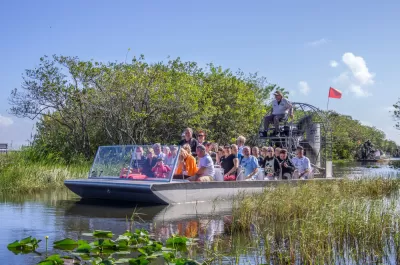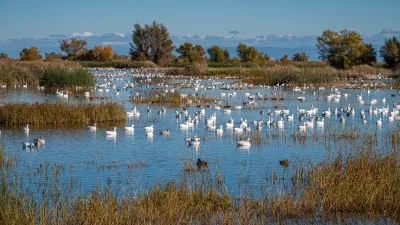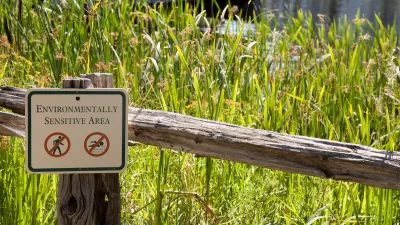An 'unprecedented' investment of more than one billion dollars will go toward efforts to restore and conserve the fragile and troubled South Florida ecosystem.

A $1.1-billion federal investment in conservation and rehabilitation efforts in the Florida Everglades will help local authorities improve water quality and eliminate sources of pollution that are destroying the ecosystem, reports Amy Green. In addition to its value as a unique and biodiverse ecosystem, the Everglades is "a watershed responsible for the drinking water of more than 8 million Floridians."
"The money also is intended to fortify the Everglades against the rising seas and other impacts of climate change. The funding is part of the infrastructure measure President Joe Biden signed into law in November and represents the single largest investment ever in Everglades restoration, according to the White House."
"Conspicuously missing from the list is one that is considered crucial in restoring the Everglades’ historic flow south: a large reservoir south of Lake Okeechobee in the Everglades Agricultural Area. That reservoir is aimed at alleviating harmful discharges east and west from Lake Okeechobee to fragile coastal estuaries like the Indian River Lagoon, which in recent years triggered widespread blooms of toxic algae." According to Green, state leaders have expressed outrage at the omission, but "The U.S. Army Corps of Engineers, the federal agency overseeing Everglades restoration, answered Mast’s criticism by saying that the corps remains committed to the reservoir, and construction is scheduled to begin this year."
FULL STORY: Biden’s Infrastructure Bill Includes an Unprecedented $1.1 Billion for Everglades Revitalization

Planetizen Federal Action Tracker
A weekly monitor of how Trump’s orders and actions are impacting planners and planning in America.

Congressman Proposes Bill to Rename DC Metro “Trump Train”
The Make Autorail Great Again Act would withhold federal funding to the system until the Washington Metropolitan Area Transit Authority (WMATA), rebrands as the Washington Metropolitan Authority for Greater Access (WMAGA).

The Simple Legislative Tool Transforming Vacant Downtowns
In California, Michigan and Georgia, an easy win is bringing dollars — and delight — back to city centers.

The States Losing Rural Delivery Rooms at an Alarming Pace
In some states, as few as 9% of rural hospitals still deliver babies. As a result, rising pre-term births, no adequate pre-term care and "harrowing" close calls are a growing reality.

The Small South Asian Republic Going all in on EVs
Thanks to one simple policy change less than five years ago, 65% of new cars in this Himalayan country are now electric.

DC Backpedals on Bike Lane Protection, Swaps Barriers for Paint
Citing aesthetic concerns, the city is removing the concrete barriers and flexposts that once separated Arizona Avenue cyclists from motor vehicles.
Urban Design for Planners 1: Software Tools
This six-course series explores essential urban design concepts using open source software and equips planners with the tools they need to participate fully in the urban design process.
Planning for Universal Design
Learn the tools for implementing Universal Design in planning regulations.
Smith Gee Studio
City of Charlotte
City of Camden Redevelopment Agency
City of Astoria
Transportation Research & Education Center (TREC) at Portland State University
US High Speed Rail Association
City of Camden Redevelopment Agency
Municipality of Princeton (NJ)





























